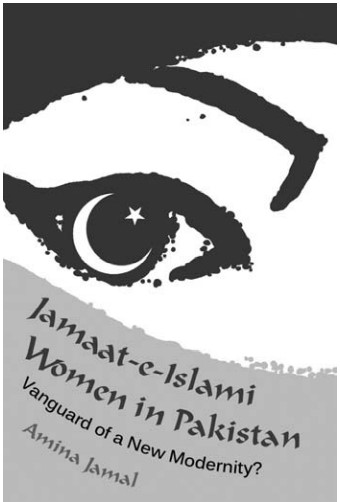I begin my review of Amina Jamal’s Jamaat-e-Islami Women in Pakistan: Vanguard of a New Modernity with a couple of questions which I consider pertinent: Do women’s multiple narratives reveal a capacity for alternative ways of negotiating the construction of conflictual identities? Does the assumption of agential roles by traditional women in a patriarchal culture cause an identity conflict crisis which can be resolved through a firm commitment to specific values and goals? Women, as evidenced by the work of constructive and rehabilitative work undertaken by political and social women activists in South Asia during both turbulent and peaceful times, have more or less power depending on their specific situation, and they can be relatively submissive in one situation and relatively assertive in another. Assessing women’s agency requires identifying and mapping power relations, the room to manoeuver within each pigeonhole and the intransigence of boundaries (Hayward 1998: 29). Jamal’s book is a much needed and scholarly look at the constructions as well as circumscriptions of ‘the Islamist project for women in contemporary Pakistan’ (p. 284).
In order to jog the memories of the readers, I underscore that in South Asia, historically, the Jamaat-e-Islami has always been pro-establishment. Although the Jamaat hasn’t enjoyed electoral success in either India, or Pakistan, or Bangladesh, the politico-religious organization has not lagged behind in forging tacit alliances to relish mainstream power. While reading Jamal’s book, which focuses on ‘the political and cultural activism of women in the Jamaat-i-Islami, which is one of the most significant politico-religious groups in Pakistan,’ and her noteworthy attempt to deconstruct the ‘anti-imperialist underpinnings of the Jamaat women’s project,’ I reiterate an oft-repeated assertion of mine that culture inscribes a wide range of experiences which centralizing institutions attempt to render invisible and homogeneous. But women in South Asia, as in other postcolonial countries, are positioned in relation to their own class and cultural realities; their own histories; their sensitivity to the diversity of cultural traditions and to the questions and conflicts within them; the legacies of Sufi Islam; their own struggles not just with the devastating effects of militarism and extremism of all hues, but also with the discourses of cultural nationalism and religious fundamentalism; their own relations to the West; their interpretations of religious law; their beliefs in the different schools of Islamic and Hindu thought; and their concepts of the role of women in contemporary societies.

